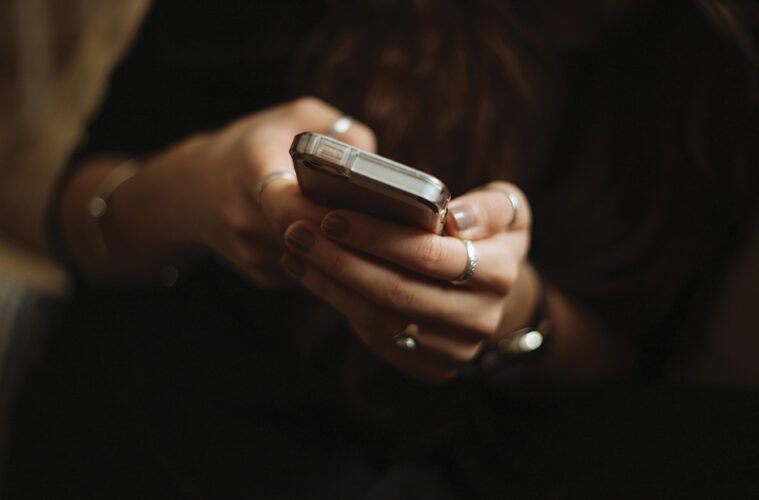BY MELANIE ULLE
Last year, I had a narrow glimpse into the lives and challenges of domestic violence survivors when a dear friend left her partner/abuser of several years. We frequently talk now about how the cell phone I gave her, and the corresponding service plan was her lifeline. I would never have known the power of a new cell phone for a person in crisis without watching it live and in real time.
One night, my friend called me, panicked and scared, locked in a bathroom with her child, while her partner banged on the door, screaming, and threatening her. She had been in there for hours and was calling friends, trying to figure out a plan. How would she depart the room safely? Mid-sentence, while I was speaking with her the line went dead. I called back and received an auto message telling me the phone had been disconnected. Her parents called me, having received the same message. Another friend, fearing the worst, called the police, and an officer was sent to the home. Her partner was told that he had to restore her service immediately and he did, but unfortunately, we learned he was using her device to track her. She left shortly after and was able to remove tracking from her phone and trust in her new service which he could not terminate.
For domestic violence survivors, escape and safety are often a race against time. In this crucial battle, a seemingly ordinary device – a cell phone – can become a lifeline. Yet, access to this critical tool can be a significant hurdle due to financial limitations or control tactics used by abusers. Understanding the importance of cell phones for survivors and how organizations can bridge the gap are essential steps towards empowering them to break free from abusive situations.
A cell phone allows survivors to call 911 in an emergency or a crisis hotline for support, counseling, and facilitates connections with friends, family, and shelters, helping survivors plan escape routes and discreetly reach safety nets. It provides documentation, which is more important than one could ever imagine. With a phone, survivors can capture evidence of abuse through photos, videos, or recordings, crucial for legal action and protection orders.
But there are barriers to access including financial strain as many survivors face financial limitations, making phone plans and data costs a burden. Abusers often use phone access as a tool for control, confiscating phones, monitoring calls, or limiting data usage. There is an enormous fear of discovery. Concerns about the abuser activating GPS tracking or monitoring calls can prevent survivors from using a phone openly.
Fortunately, we’re now seeing groups stepping up to help. Several organizations recognize the critical role cell phones play in a survivor’s journey towards safety.
Organizations like HopeLine from Verizon or Asurion’s Wireless for Life program provide survivors with free or discounted phones and data plans. Other organizations offer emergency replacement phones in situations where survivors have lost or had their phones damaged or confiscated by the abuser. There are workshops that teach survivors how to use privacy settings, disable location tracking, and remove spyware to avoid the abuser’s control. Providing pre-paid phones with limited data plans can offer a discreet communication option for survivors facing financial limitations.
While these efforts are commendable, further action is needed to ensure universal access to cell phones for survivors. We need policy changes. When I was trying to get a phone for my friend in crisis, the red tape for her to move her line over was nearly impossible, so I just paid for a new plan. We need to push for policies that require mobile carriers to offer discounted or free plans for domestic violence survivors. We need public-private partnerships between government agencies, mobile carriers, and advocacy groups to establish comprehensive cell phone access programs.
We need more community resources. My friend is a very educated professional, and the two of us needed help gathering information. Raising awareness within communities about the importance of cell phone access for survivors and encouraging donations or volunteer programs for phone distribution is critical to solving this problem.
By prioritizing cell phone accessibility for domestic violence survivors, we empower them to reach for help, document abuse, and take control of their situations. This seemingly simple step can have life-altering consequences, fostering independence, safety, and a pathway to a violence-free future.
If you or someone you know is in a dangerous domestic situation, please reach out to one of the following organizations for guidance and support. This is not at all a comprehensive list of service providers.
SafeHouse Denver offers comprehensive services including a crisis line, an emergency shelter, non-residential counseling center, and an extended-stay program.
The Family Tree provides financial, legal and parenting support to help survivors.
Rose Andom Center offers specialized services for survivors and their children.
And if you’re a friend or family member, please consider making the small but powerful investment of a phone. It may save your loved one’s life.

